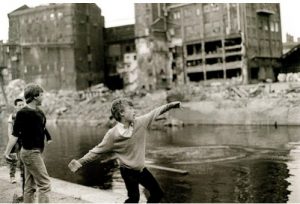 January saw the University of Sussex host the ‘Seen But Not Heard?’ conference which sought to bring together scholars from a wide range of disciplines who have a shared interest in the histories of childhood and youth. The conference considered youth in a variety of emotional, spatial, and material sites from antiquity to modernity. The second panel on day one of the conference, chaired by Alex Lloyd of the University of Oxford, brought together a collection of papers that considered ‘youth and the city’. Whether by accident or design, it was notable that the papers from this panel all had a port town connection, despite their diverse content.
January saw the University of Sussex host the ‘Seen But Not Heard?’ conference which sought to bring together scholars from a wide range of disciplines who have a shared interest in the histories of childhood and youth. The conference considered youth in a variety of emotional, spatial, and material sites from antiquity to modernity. The second panel on day one of the conference, chaired by Alex Lloyd of the University of Oxford, brought together a collection of papers that considered ‘youth and the city’. Whether by accident or design, it was notable that the papers from this panel all had a port town connection, despite their diverse content.
The panel opened with my own paper “Regional variances in approaches to camping by British youth movements, 1886 – 1936”. Through an examination of the application of the Boys’ Brigade in the port towns of Glasgow, London, and Bristol, the paper considered the regional variances in the application of camping at the local level. The paper argued that previous histories have perhaps focused attention too closely on the position of the national organisation at the detriment of the grassroots. By looking in detail at the nuances in approaches to camping expeditions by Boys’ Brigade Companies from port towns, the paper offered an alternative perspective to the homogenous perspective that has dominated historiography.
The second paper on the ‘youth and the city’ panel, delivered by Jenny Bavidge, offered a perspective of youth from a literary perspective. Titled “A Peep Into London’: Guides to London for Children from the 18th century to the present day”, the paper examined the genre of the London guidebook as it is written and presented to child consumers. The paper maintained that these guidebooks established an alternative relationship between their child readers and the city, where the child observer lacked agency. However, it is interesting to note that, where the voices were heard, it was on the water that enjoyment was to be found most clearly expressed.
The third and final paper was given by Daniel Warner from the University of Liverpool. His paper, “Despite all that, they seemed really happy” offered a perspective of the experiences of youth during years of decline in Liverpool from the late 1960s to the 1980s. The paper offered a vibrant account of the changing nature of the port city space in Liverpool in these decades, and was accompanied by photographic accounts of the interactions between young people and the changing city space. The ways in which young people reacted to a landscape that had altered from streets of terraced communities to new estates of high-rise flats was explored with a view to highlighting the often lost voice of children in a period of urban decline.
By locating this lost voice of young people, and examining sites of childhood and youth from their perspective, historians are afforded an alternative perspective to consider the world in which they interacted. Moreover, from the perspective of the ever changing space of the port town, the adaptability, flexibility, and curiosity of young people – as was displayed in the three papers of this panel – can offer a useful tool for historians to explore the societal changes within port towns.










Hello Chris
This seems very interesting…..
I shall pass this on to Robin Bolton who as you know has a great interest in the BB and who has written several books on the subject.
Look forward to having you back bugling soon
Kind regards
Paul
Hello Paul,
Thanks you for your comments.
Thanks for passing on to Mr Bolton. Hope he finds the blog post of interest.
best
Chris